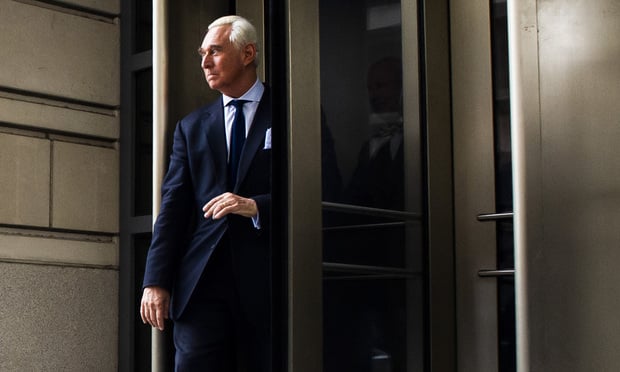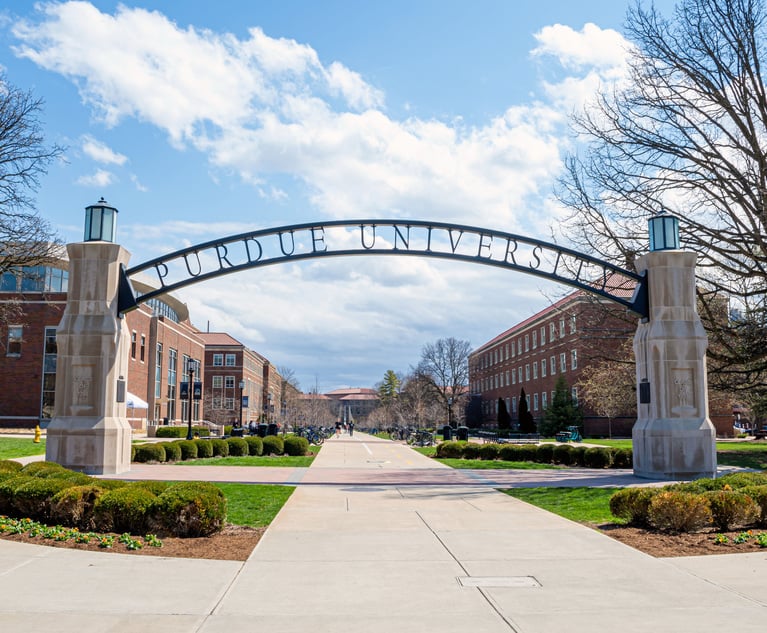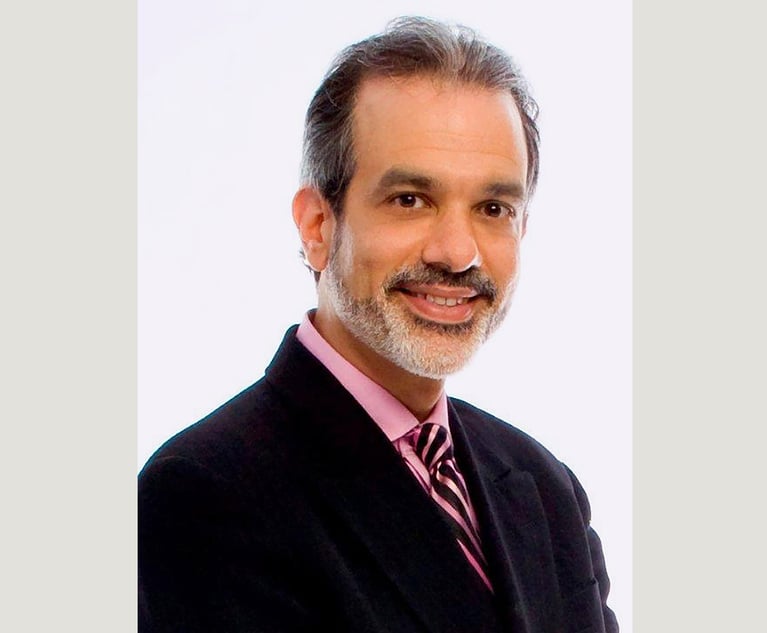Roger Stone's Lawyers Offer Final Defense to Jurors: 'So What?'
The jury is expected to begin deliberations Thursday.
November 13, 2019 at 04:56 PM
6 minute read
The original version of this story was published on National Law Journal
 Roger Stone, indicted by the team of Special Counsel Robert Mueller, departs federal court after attending his arraignment. Photo: Diego M. Radzinschi / NLJ
Roger Stone, indicted by the team of Special Counsel Robert Mueller, departs federal court after attending his arraignment. Photo: Diego M. Radzinschi / NLJ
When it comes to Roger Stone's contacts with the Trump campaign about WikiLeaks in 2016, Stone's attorney had a clear message: "So what?"
That's the argument defense attorney Bruce Rogow made to the jury during closing arguments for Stone's trial on Wednesday. Rogow said Stone had no reason to lie to the House Intelligence Committee during his closed-door interview with lawmakers in 2017.
"He has no motive to lie because protecting the campaign is a nonissue," Rogow said, noting that Stone testified months after the campaign ended.
"There could be no sensible motive in trying to protect the campaign when the campaign was long since over, and Mr. Trump was the president of the United States," he added.
Protecting Trump's 2016 campaign is the motive prosecutors have offered since the trial started last week.
But Rogow argued Wednesday the story was far more complicated than that. He said Stone was trying to comply with the criteria of the House Intelligence Committee's Russia probe during his testimony. That criteria, which laid out the scope of the investigation on Russian interference in the 2016 election, did not specifically mention WikiLeaks. Stone was interviewed by the committee as part of that probe.
"The committee set the rule and Roger Stone tried to comply with that rule over and over again," Rogow said.
Rogow returned to the argument he made to the jury during his opening statement, that jurors have to consider Stone's "state of mind" when he was testifying with the House Intelligence Committee.
"What we got here is failure to communicate," Rogow told the jury, quoting the movie "Cool Hand Luke." And he placed the blame for Stone's remarks on the committee and its parameters, which focused on Russian election interference.
Rogow was further dismissive of the government's charge of witness tampering against Stone, and its claim that Stone pressured his associate Randy Credico to not submit to an interview with lawmakers.
Rather, Rogow argued, Credico "played" Stone by convincing Stone he had inside information on WikiLeaks. And he described Credico as the kind of person who can't be trusted, meaning that the jury couldn't rely on him to convict Stone.
"These two guys tampered with one another for 20 years, over all kinds of crazy things," Rogow said.
During his closing argument, prosecutor Jonathan Kravis walked the jury through the five categories of lies the government alleges Stone made during his 2017 testimony with the House Intelligence Committee.
He played the audio of Stone making the alleged false statements, and then pulled up evidence, such as emails and texts sent between Stone and his associates, that contradicted Stone's remarks.
Kravis referred to two of Stone's alleged lies—that Stone didn't have documents about his contacts on WikiLeaks, and that Stone didn't discuss WikiLeaks head Julian Assange with third parties—as "whoppers."
And he referenced Stone's comments to the House Intelligence Committee claiming that he didn't text or email much, and that he only communicated with his intermediary during phone calls.
"No text messages? Not an email guy?" Kravis said. "Are you kidding me?" The prosecutor then pulled up a chart showing Stone exchanged more than 70 texts with Credico alone on the day of Stone's testimony with the House Intelligence Committee.
As for the witness-tampering charge against Stone, Kravis argued that Stone knew Credico was the "one guy out there who can knock down this whole house of cards." As a result, the prosecutor claimed that Stone repeatedly pressured Credico not to testify, telling Credico to assert his Fifth Amendment rights and to "do a Frank Pentangeli," in reference to "The Godfather: Part II" character who lies to a congressional committee.
Kravis also offered up evidence that Stone interfered with the House Intelligence Committee's Russia probe by lying. He said the committee's final Russia report was inaccurate and incomplete, and that lawmakers were blocked from accessing witnesses such as Credico and Corsi as a result of Stone's actions.
Federal prosecutor Michael Marando also delivered an animated response to Rogow's closing argument. He said that Stone's lies were clearly laid out in the written evidence they presented in the case, including dozens of Stone's own texts and emails to other people.
"You know the great thing about a document?" Marando told the jury. "A document doesn't lie."
And Marando offered a strong rebuke to Rogow's assertion of "so what."
"Well, if that's the state of affairs that we're in, I'm pretty shocked," Marando said. "Truth still matters."
"In our institutions, in courts of law and committee hearings, truth still matters. And Mr. Stone came in, and he lied to Congress," Marando continued. "He obstructed their investigation and he tampered with a witness and that matters. And you don't look at that, and you say, 'so what.'"
At the end of closing arguments, U.S. District Judge Amy Berman Jackson sent the jury home for the day, saying she will deliver the jury instructions Thursday morning. The jury will begin deliberations after that.
The jury heard evidence and testimony from witnesses for less than four days during the trial.
The government called up key figures from the Trump campaign to testify, such as former Trump campaign head Steve Bannon and ex-deputy campaign chairman Rick Gates. Bannon's testimony ultimately played down just how seriously he took Stone's information about forthcoming WikiLeaks releases.
But Gates' testimony Tuesday painted a much more damning picture for Trump, as he testified that Trump and Stone were in touch about potential upcoming dumps of hacked emails damaging to the Clinton campaign.
Credico also took the stand, maintaining he was not Stone's intermediary to WikiLeaks. Credico recounted messages he sent Stone, warning he was committing perjury by naming Credico as the WikiLeaks backchannel.
However, Stone's attorneys did not call any witnesses for the defense. Rather, they allowed the jury to listen to roughly 50 minutes of audio from Stone's testimony before the House Intelligence Committee in 2017, during which Stone is alleged to have made false statements.
They also submitted into evidence more than 70 exhibits from both the government and their team, but did not discuss them openly with the jury. Jurors will be able to examine the documents during their deliberations.
Read more:
Lawyers' Private Talks With Judge at Roger Stone Trial Offer Hints About Their Tactics
No Bleeping Required: Jury Gets Uncensored Look at Roger Stone's Messages
Roger Stone's Lawyers Unveil Their Defense: He Didn't Mean to Lie
Steve Bannon Expected to Appear as Government Witness in Roger Stone's Trial
This content has been archived. It is available through our partners, LexisNexis® and Bloomberg Law.
To view this content, please continue to their sites.
Not a Lexis Subscriber?
Subscribe Now
Not a Bloomberg Law Subscriber?
Subscribe Now
NOT FOR REPRINT
© 2025 ALM Global, LLC, All Rights Reserved. Request academic re-use from www.copyright.com. All other uses, submit a request to [email protected]. For more information visit Asset & Logo Licensing.
You Might Like
View All
Longtime Purdue GC Accused of Drunken Driving Hires Big-Name Defense Attorney
3 minute read

'Careless Execution' of Presidential Pardons Freed Convicted Sex Trafficker, US Judge Laments

'You Became a Corrupt Politician': Judge Gives Prison Time to Former Sen. Robert Menendez for Corruption Conviction
5 minute readTrending Stories
- 1How Alzheimer’s and Other Cognitive Diseases Affect Guardianship, POAs and Estate Planning
- 2How Lower Courts Are Interpreting Justices' Decision in 'Muldrow v. City of St. Louis'
- 3Phantom Income/Retained Earnings and the Potential for Inflated Support
- 4Should a Financially Dependent Child Who Rejects One Parent Still Be Emancipated?
- 5Advising Clients on Special Needs Trusts
Who Got The Work
J. Brugh Lower of Gibbons has entered an appearance for industrial equipment supplier Devco Corporation in a pending trademark infringement lawsuit. The suit, accusing the defendant of selling knock-off Graco products, was filed Dec. 18 in New Jersey District Court by Rivkin Radler on behalf of Graco Inc. and Graco Minnesota. The case, assigned to U.S. District Judge Zahid N. Quraishi, is 3:24-cv-11294, Graco Inc. et al v. Devco Corporation.
Who Got The Work
Rebecca Maller-Stein and Kent A. Yalowitz of Arnold & Porter Kaye Scholer have entered their appearances for Hanaco Venture Capital and its executives, Lior Prosor and David Frankel, in a pending securities lawsuit. The action, filed on Dec. 24 in New York Southern District Court by Zell, Aron & Co. on behalf of Goldeneye Advisors, accuses the defendants of negligently and fraudulently managing the plaintiff's $1 million investment. The case, assigned to U.S. District Judge Vernon S. Broderick, is 1:24-cv-09918, Goldeneye Advisors, LLC v. Hanaco Venture Capital, Ltd. et al.
Who Got The Work
Attorneys from A&O Shearman has stepped in as defense counsel for Toronto-Dominion Bank and other defendants in a pending securities class action. The suit, filed Dec. 11 in New York Southern District Court by Bleichmar Fonti & Auld, accuses the defendants of concealing the bank's 'pervasive' deficiencies in regards to its compliance with the Bank Secrecy Act and the quality of its anti-money laundering controls. The case, assigned to U.S. District Judge Arun Subramanian, is 1:24-cv-09445, Gonzalez v. The Toronto-Dominion Bank et al.
Who Got The Work
Crown Castle International, a Pennsylvania company providing shared communications infrastructure, has turned to Luke D. Wolf of Gordon Rees Scully Mansukhani to fend off a pending breach-of-contract lawsuit. The court action, filed Nov. 25 in Michigan Eastern District Court by Hooper Hathaway PC on behalf of The Town Residences LLC, accuses Crown Castle of failing to transfer approximately $30,000 in utility payments from T-Mobile in breach of a roof-top lease and assignment agreement. The case, assigned to U.S. District Judge Susan K. Declercq, is 2:24-cv-13131, The Town Residences LLC v. T-Mobile US, Inc. et al.
Who Got The Work
Wilfred P. Coronato and Daniel M. Schwartz of McCarter & English have stepped in as defense counsel to Electrolux Home Products Inc. in a pending product liability lawsuit. The court action, filed Nov. 26 in New York Eastern District Court by Poulos Lopiccolo PC and Nagel Rice LLP on behalf of David Stern, alleges that the defendant's refrigerators’ drawers and shelving repeatedly break and fall apart within months after purchase. The case, assigned to U.S. District Judge Joan M. Azrack, is 2:24-cv-08204, Stern v. Electrolux Home Products, Inc.
Featured Firms
Law Offices of Gary Martin Hays & Associates, P.C.
(470) 294-1674
Law Offices of Mark E. Salomone
(857) 444-6468
Smith & Hassler
(713) 739-1250








